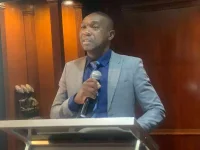Political tensions have escalated within Zimbabwe's ruling Zanu PF party. Officials in Masvingo province suspended two parliamentarians from party activities over alleged factionalism, amid growing discord over President Emmerson Mnangagwa's bid to extend his term beyond constitutional limits.
Benjamin Ganyiwa of Gutu East and Roy Bhila of Chiredzi North face disciplinary action after attending what party provincial chairman Robson Mavhenyengwa described as a "secret" meeting at Ganyiwa's homestead. The gathering included party members from outside his constituency and bypassed district and provincial leadership structures.
The suspensions reflect deeper political rifts within Zanu PF, as supporters of Vice President Constantino Chiwenga resist efforts by Mnangagwa loyalists to amend the constitution and extend the president's second term from 2028 to 2030. Bhila had previously served as deputy industry and commerce minister before Mnangagwa removed him from the position in November 2023.
The matter has been referred to the party's national disciplinary committee, led by Chairperson Oppah Muchinguri. Any decision to expel the lawmakers would require confirmation from the politburo, where Chiwenga's allies might challenge the move. "No one is bigger than the party; the disciplinary process will be followed through, regardless of one's position within the party," Mavhenyengwa stated.
These developments in Masvingo, traditionally a stronghold of Mnangagwa's support, coincide with turmoil in Mashonaland West province. There, party officials recommended the expulsion of central committee member Blessed Geza after he declared that Mnangagwa "must go" and deemed the 82-year-old leader "unfit to run this country."
Provincial chairman and Justice Minister Ziyambi Ziyambi announced plans to request Police Commissioner Stephen Mutamba investigate a historical murder case allegedly involving Geza. "If you murder someone, the case does not just disappear; we're going to tell Mutamba to investigate," Ziyambi declared.
The internal strife bears a striking resemblance to events preceding the 2017 military intervention led by Chiwenga, which ultimately brought Mnangagwa to power after his brief exile. These parallels have heightened concerns about potential political instability within Zimbabwe's governing party.
Benjamin Ganyiwa of Gutu East and Roy Bhila of Chiredzi North face disciplinary action after attending what party provincial chairman Robson Mavhenyengwa described as a "secret" meeting at Ganyiwa's homestead. The gathering included party members from outside his constituency and bypassed district and provincial leadership structures.
The suspensions reflect deeper political rifts within Zanu PF, as supporters of Vice President Constantino Chiwenga resist efforts by Mnangagwa loyalists to amend the constitution and extend the president's second term from 2028 to 2030. Bhila had previously served as deputy industry and commerce minister before Mnangagwa removed him from the position in November 2023.
The matter has been referred to the party's national disciplinary committee, led by Chairperson Oppah Muchinguri. Any decision to expel the lawmakers would require confirmation from the politburo, where Chiwenga's allies might challenge the move. "No one is bigger than the party; the disciplinary process will be followed through, regardless of one's position within the party," Mavhenyengwa stated.
These developments in Masvingo, traditionally a stronghold of Mnangagwa's support, coincide with turmoil in Mashonaland West province. There, party officials recommended the expulsion of central committee member Blessed Geza after he declared that Mnangagwa "must go" and deemed the 82-year-old leader "unfit to run this country."
Provincial chairman and Justice Minister Ziyambi Ziyambi announced plans to request Police Commissioner Stephen Mutamba investigate a historical murder case allegedly involving Geza. "If you murder someone, the case does not just disappear; we're going to tell Mutamba to investigate," Ziyambi declared.
The internal strife bears a striking resemblance to events preceding the 2017 military intervention led by Chiwenga, which ultimately brought Mnangagwa to power after his brief exile. These parallels have heightened concerns about potential political instability within Zimbabwe's governing party.












